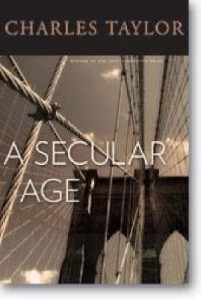Taylor, Charles (2007). A Secular Age. Cambridge, MA: Belknap Press of Harvard University Press. 874 pp. $40, ISBN 9780674026766
Charles Taylor, eminent, prize-winning philosopher, asks this question: “…Why was it virtually impossible not to believe in God in, say, 1500 in our Western society, while in 2000 many of us find this not only easy, but even inescapable?”
Taylor’s answer is interesting because he does not merely list the various permutations of religious belief: Plato, Aquinas, The Reformation, Deism, the Vatican II council, and so on, although certainly these are discussed. Rather, he tries to identify the changes in intellectual and social life that made what was recently unthinkable, now a reasonable choice. He is interested not just in belief itself, but in the conditions that make belief possible.
This sprawling tome is a difficult read, and at the end of the journey, I got the feeling that Taylor, a Roman Catholic, had decided that the secular age has triumphed so thoroughly that he could only offer a few whimpers of regret. Without saying so, he seemed to be waving a poignant farewell to religion.

